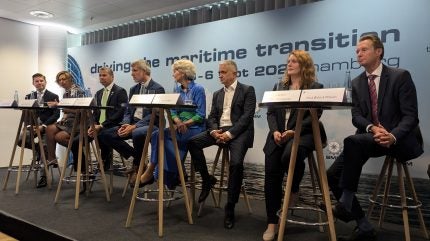
“We made history last year” declared Arsenio Dominguez, Secretary General of the International Maritime Organisation (IMO) at the grand Opening Ceremony of SMM in 2024, remarking on the decarbonisation targets of 2050 set by the UN arm in 2023.
Under the banner “Driving the Transition” the shipping industry is meeting to discuss how the transition away from heavy fuel oil and diesel can actually happen.
A glance at the conference map showed specific areas for discussions on Future Fuels, AI and Digital Security, which is often a good way of understanding what the big topics of any conference are likely to be.
Along with geopolitics, which is always tied to the shipping sector, it was these topics that dominated the first day of talks and addresses.
While the public might look at the IMO target date of 2050 for carbon neutrality as a conservative one, Dominguez and his fellow speakers largely agreed it was genuinely progressive.
“The key word is transition. It is not overnight,” Dominguez said. And that was echoed by Silke Lehmkoester, the managing director of Fleet at Hapag-Lloyd.

US Tariffs are shifting - will you react or anticipate?
Don’t let policy changes catch you off guard. Stay proactive with real-time data and expert analysis.
By GlobalDataWith all the best will in the world, there are limited resources for building the hardware that the shipping sector needs to be free of fossil fuels, she told the conference.
“If you look at order books for new builds, they are full…. So we are doing a lot of retrofitting, [but] yard spots are already becoming sacred and we have to fight to retrofit. All over the industry, the ambitions are extremely high,” Lehmkoester explained.
But from the fuelling perspective, Uwe Lauber, CEO of MAN Energy Solutions shared his doubts and concerns on the transition – despite his belief the sector is travelling in the right direction.
“The technology is ready,” he told the audience. “The question now is on available fuels. We need to speed up. What we can do now is [focused on] efficiency.”
But Lauber said the sector needs to change its way of thinking, and fast, to keep up with China.
He put it simply. “The plan to execute is not there,” he said.
The outside view is that 2050 is a long-term plan, and a conservative one. But to the shipping sector, according to the regulator and the companies involved, it’s “tomorrow.”
Key to this transition is the size of the industry. The IMO has 176 member states, and the shipping sector touches the entire globe.
“The speed of the transition is aimed at keeping the business running,” Dominguez said.



